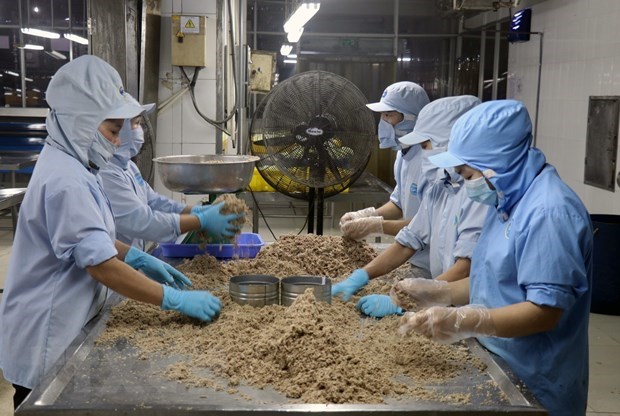
Workers at a fish processing factory in Vietnam (Illustrative photo: VNA)
Vietnam’s relative economic success is somewhat surprising considering that the country’s government has affirmed that it won’t put economic recovery ahead of public health, it noted.
Vietnam is not only the envy of its COVID-hit Southeast Asian neighbours, but it has also earned international plaudits for its resilience, according to the article.
The article cited the Lowy Institute’s Asia Power Index published last month, which revealed that Vietnam’s international image was one of the Asia-Pacific’s best improvers this year, with its score on diplomatic influence gaining six percentage points.
Earlier this year, Vietnam had the third-highest improvement in international reputation because of its handling of the pandemic.
In some ways, Vietnam had advantages over its Southeast Asian neighbours, the article continued.
The service sector accounted for 45 percent of Vietnam’s GDP last year but grew by just 3.2 percent in the first quarter of 2020, down from 6.5 percent in the same period last year.
“Vietnam’s economy is also less dependent than other Southeast Asian nations on tourism, which accounted for 9 percent of its GDP in 2018, compared with 32 percent for Cambodia and 20 percent for Thailand. It has thus faced less pressure due to the collapse of international travel”.
The country also went into 2020 on the back of two years of robust foreign direct investment flows. In June, Vietnam ratified the EU-Vietnam Free Trade Agreement and recently play host to a signing ceremony for the Regional Comprehensive Economic Partnership, the world’s largest, Asia-centric trade pact which Vietnam is now a member.
According to the article, the IMF in its latest reported noted that Hanoi’s ‘decisive steps to contain the health and economic fallout from COVID-19’ were a primary reason for positive economic growth this year, a recognition of the Communist Party of Vietnam’s quick and competent response.
The IMF expects that recovery to carry over strongly into 2021 with growth of 6.5 percent as normalisation of domestic and foreign economic activity continues.
In the first nine months of the year, Vietnam recorded 21.2 billion USD in new foreign investment projects and overseas capital injections, equivalent to around 80 percent of the investment it received over the same period last year.
Many of the investments made this year won’t begin operations until 2021 or later, which also points to a healthy economic recovery./.
VNA
 Indonesia’s palm oil production set to rise 10% in 2025
Indonesia’s palm oil production set to rise 10% in 2025



